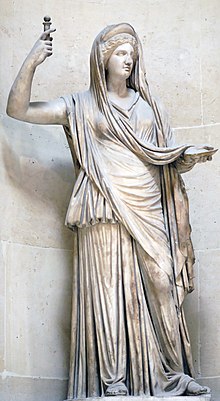Hera
| Hera | |
|---|---|
Queen of the Gods Goddess of marriage, women, childbirth, and family | |
| Member of the Twelve Olympians | |
 | |
| Abode | Mount Olympus |
| Symbol | Pomegranate, peacock feather, diadem, cow, lily, lotus, cuckoo, panther, scepter, throne, lion |
| Mount | Chariot drawn by peacocks |
| Personal information | |
| Parents | Cronus and Rhea |
| Siblings | Poseidon, Hades, Demeter, Hestia, Zeus, Chiron |
| Consort | Zeus |
| Children | Angelos, Ares, Eileithyia, Enyo, Eris, Hebe, Hephaestus |
| Roman equivalent | Juno |
| Etruscan equivalent | Uni |
| Part of a series on |
| Ancient Greek religion |
|---|
 |
|
Hera (/ˈhɛrə, ˈhɪərə/; Greek: Ἥρα, translit. Hḗrā; Ἥρη, Hḗrē in Ionic and Homeric Greek) is the goddess of women, marriage, family and childbirth in ancient Greek religion and mythology, one of the twelve Olympians and the sister and wife of Zeus. She is the daughter of the Titans Cronus and Rhea. Hera rules over Mount Olympus as queen of the gods. A matronly figure, Hera served as both the patroness and protectress of married women, presiding over weddings and blessing marital unions. One of Hera's defining characteristics is her jealous and vengeful nature against Zeus' numerous lovers and illegitimate offspring, as well as the mortals who cross her.

Hera is commonly seen with the animals she considers sacred, including the cow, lion and the peacock. Portrayed as majestic and solemn, often enthroned, and crowned with the polos (a high cylindrical crown worn by several of the Great Goddesses), Hera may hold a pomegranate in her hand, emblem of fertile blood and death and a substitute for the narcotic capsule of the opium poppy.[1]
Her Roman counterpart is Juno.[2]
Etymology[]
The name of Hera has several possible and mutually exclusive etymologies; one possibility is to connect it with Greek ὥρα hōra, season, and to interpret it as ripe for marriage and according to Plato ἐρατή eratē, "beloved"[3] as Zeus is said to have married her for love.[4] According to Plutarch, Hera was an allegorical name and an anagram of aēr (ἀήρ, "air").[5] So begins the section on Hera in Walter Burkert's Greek Religion.[6] In a note, he records other scholars' arguments "for the meaning Mistress as a feminine to Heros, Master." John Chadwick, a decipherer of Linear B, remarks "her name may be connected with hērōs, ἥρως, 'hero', but that is no help since it too is etymologically obscure."[7] A. J. van Windekens,[8] offers "young cow, heifer", which is consonant with Hera's common epithet βοῶπις (boōpis, "cow-eyed"). R. S. P. Beekes has suggested a Pre-Greek origin.[9] Her name is attested in Mycenaean Greek written in the Linear B syllabic script as WIKI